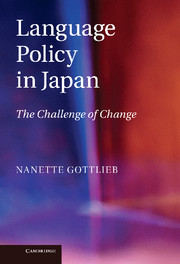Book contents
- Frontmatter
- Contents
- Preface
- Acknowledgments
- 1 Language ideology, planning and policy
- 2 The language needs of immigrants
- 3 Foreign languages other than English in education and the community
- 4 Technology and language policy change
- 5 National language policy and an internationalising community
- Conclusion
- Notes to the text
- References
- Index
1 - Language ideology, planning and policy
Published online by Cambridge University Press: 05 December 2011
- Frontmatter
- Contents
- Preface
- Acknowledgments
- 1 Language ideology, planning and policy
- 2 The language needs of immigrants
- 3 Foreign languages other than English in education and the community
- 4 Technology and language policy change
- 5 National language policy and an internationalising community
- Conclusion
- Notes to the text
- References
- Index
Summary
This book examines two important issues in language policy in Japan today: first, and most prominently, increasing migration-induced multilingualism which has ramifications both for providing Japanese-language learning opportunities for migrants and for the use and teaching of languages other than Japanese and English; and second, the influence of electronic technologies such as computers and cell phones on the way in which Japanese is written. These two developments, of course, have occurred in many other countries beside Japan. What makes the Japanese case particularly interesting is that Japan does not yet consider itself to be a country of immigration and hence has only recently shown signs of an awareness of the importance of providing both language teaching and multilingual services for non-Japanese workers, so that what policy development does exist in this area is ad hoc and fragmented rather than centrally planned and coordinated at national level. It also has in place a set of longstanding policies pertaining to the officially sanctioned use of the writing system, policies which were arrived at after a great deal of division and debate, that shape the way in which Japanese and non-Japanese children alike learn to read and write in Japanese schools. In both these cases, official and individual views are strongly informed by language ideologies of various kinds.
Any study of a society's language policy must take into account the ideological context within which language functions because language ideologies always mediate and sometimes directly shape the formulation of such policy. To speak of language policy in Japan in isolation from national ideas about language would be to see only a part of the whole picture. Language ideology plays an important role in discussions of issues pertinent to this study, such as the provision of multilingual services for migrants, the current ‘tabunka kyōsei’ (multicultural coexistence) policy discourse influencing local communities, the teaching of foreign languages other than English and the prominence of non-standard orthographic conventions online. The most strongly entrenched and overarching ideology is a lingering belief that Japan is monolingual.
- Type
- Chapter
- Information
- Language Policy in JapanThe Challenge of Change, pp. 1 - 32Publisher: Cambridge University PressPrint publication year: 2011

